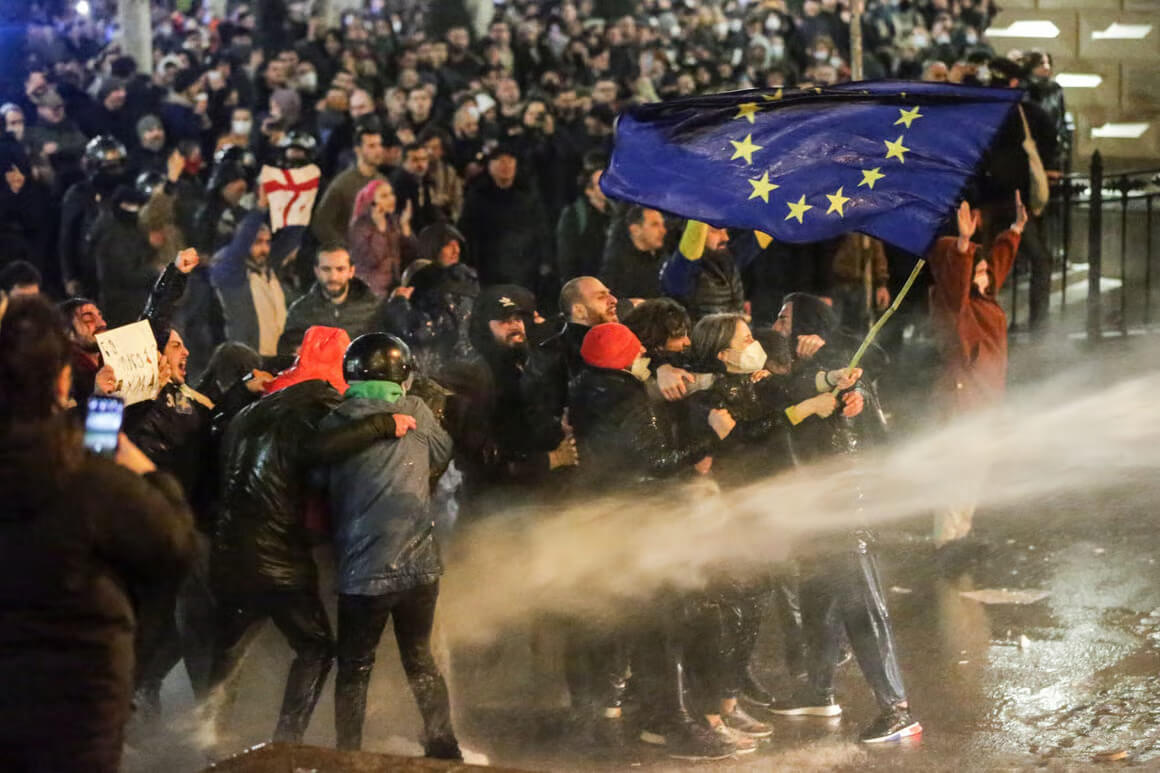Protests in Tbilisi continued for the second day, as thousands of citizens opposed the Georgian Parliament’s decision to pass the ‘foreign agent’ bill, which they believe will curtail press freedoms and civil liberties.
Police Clash with Protestors
Protestors carrying flags of Georgia and the EU attempted to break through metal barricades outside the parliament. The police retorted by using water cannons and pepper spray to disperse the crowds.
Official reports say that 50 police officers were injured in the skirmishes that ensued. Government equipment and public property were also reported to be damaged by protestors. The Interior Ministry accused protestors of attacking the parliament and using Molotov cocktails and fireworks.
WATCH: Police forces spray water jets on Pro-#EU citizens in the streets of #Tbilisi in #Georgia. The citizens gathered to protest a draft law that would restrict press freedom by labelling organisations with overseas funding as "foreign agents". #NoToRussianLaw pic.twitter.com/KYDL0w0OVz
— Statecraft (@statecraftdaily) March 8, 2023
Consequently, 77 protestors were arrested by security officials, which included an opposition leader who was beaten by police officers.
The Law
Protests broke out in the capital city on Tuesday after the Georgian Parliament passed the first reading of the law titled “On Transparency of Foreign Influence.” Seventy-six voted in favour of the law, with 13 opposing it.
The proposed law mandates organisations that receive over 20% of their funding from outside the country to register as “foreign agents” or pay fines worth $9,500.
I am very concerned about Georgia’s Foreign Influence Law, which impedes crucial work of civil society and media and is incompatible with EU standards. I urge Georgia to uphold its commitment to the rule of law, democracy and human rights, including the right to peaceful protest. https://t.co/ZiuUWywIZ6
— Wopke Hoekstra (@WBHoekstra) March 8, 2023
It was presented by the anti-West People’s Power movement, an ally of the ruling government, and supported by 76 parliamentarians from the ruling Georgian Dream party, who believe it ensures “transparency of foreign influence.”
It largely mimics a Russian law that imposes restrictions on non-governmental organisations. If passed, Georgia will join other former Soviet Union nations, including Belarus, Tajikistan, and Azerbaijan, in passing the restrictive law.
2. Foreign connection.
— The Poll Lady (@ThePollLady) March 9, 2023
Protestors were seen waving the EU flag, as many foreign-funded NGOs who lobby to join the European Commission in Georgia will now have to disclose their source of funding. pic.twitter.com/BSWYUz1Y8y
Supporting the bill, Chair of the Georgian Dream party and PM Irakli Garibashvili said that the “radical opposition” was responsible for misleading protestors to commit “unprecedented violence.”
Pro-EU Georgian President Salome Zourabichvili extended her support for the protestors, saying that the voices of the demonstrators “represent [a] free Georgia” that sees itself as a part of the EU. She highlighted that the law was “dictated by Moscow.”
She also said she would veto the law, even though the parliament has the majority support needed to overturn the power.
International Leaders Extend Support
US State Department spokesperson Ned Price lamented the Parliament’s decision to pass the bill, saying it will “strike at some of the very rights that are central to the aspirations of the people of Georgia.”
EU foreign policy chief Josep Borrell said it was “incompatible with EU values and standards,” particularly as Georgia seeks to become a member of the bloc.
I am disturbed by the footage of violence against peaceful protesters in #Georgia.
— Kaja Kallas (@kajakallas) March 8, 2023
Events in Georgia remind us that democracies may also gradually erode at the hands of elected leaders. https://t.co/bI8GDMuyVU
Estonia, Latvia, and Lithuania also released a joint statement on Wednesday, calling on the Georgian Parliament to “responsibly assess the real interests of the country” and avoid undermining Georgian citizens’ aspirations to join the EU and NATO.
Additionally, international rights groups, such as Amnesty International and Human Rights Watch, opposed the law and its impact on civil rights and liberties.
Georgia’s EU Membership Bid
Georgia applied to join the EU, along with Ukraine and Moldova, just days after Russia invaded Ukraine in February 2022. In June, the bloc granted the former Soviet Union nation candidate status. Nevertheless, the EU urged Georgia to introduce specific reforms before it could be welcomed as a full member.
Georgia. This is what happens when post-Soviets don’t accept russian rules of life. Stay strong, Tbilisi! pic.twitter.com/eejuRZjB0x
— Iuliia Mendel (@IuliiaMendel) March 8, 2023
The opposition leaders and protestors fear that the law will obstruct Georgia’s bid to join the EU — a proposal that has the support of 80% of citizens.
Amid fears of Georgia aligning with the West, Russia is seeking to assert control over the former Soviet Union nation.
Moscow invaded Georgia in 2008, 17 years after it secured independence. It continues to hold control over South Ossetia and Abkhazia, which comprise 20% of Georgian territory.

